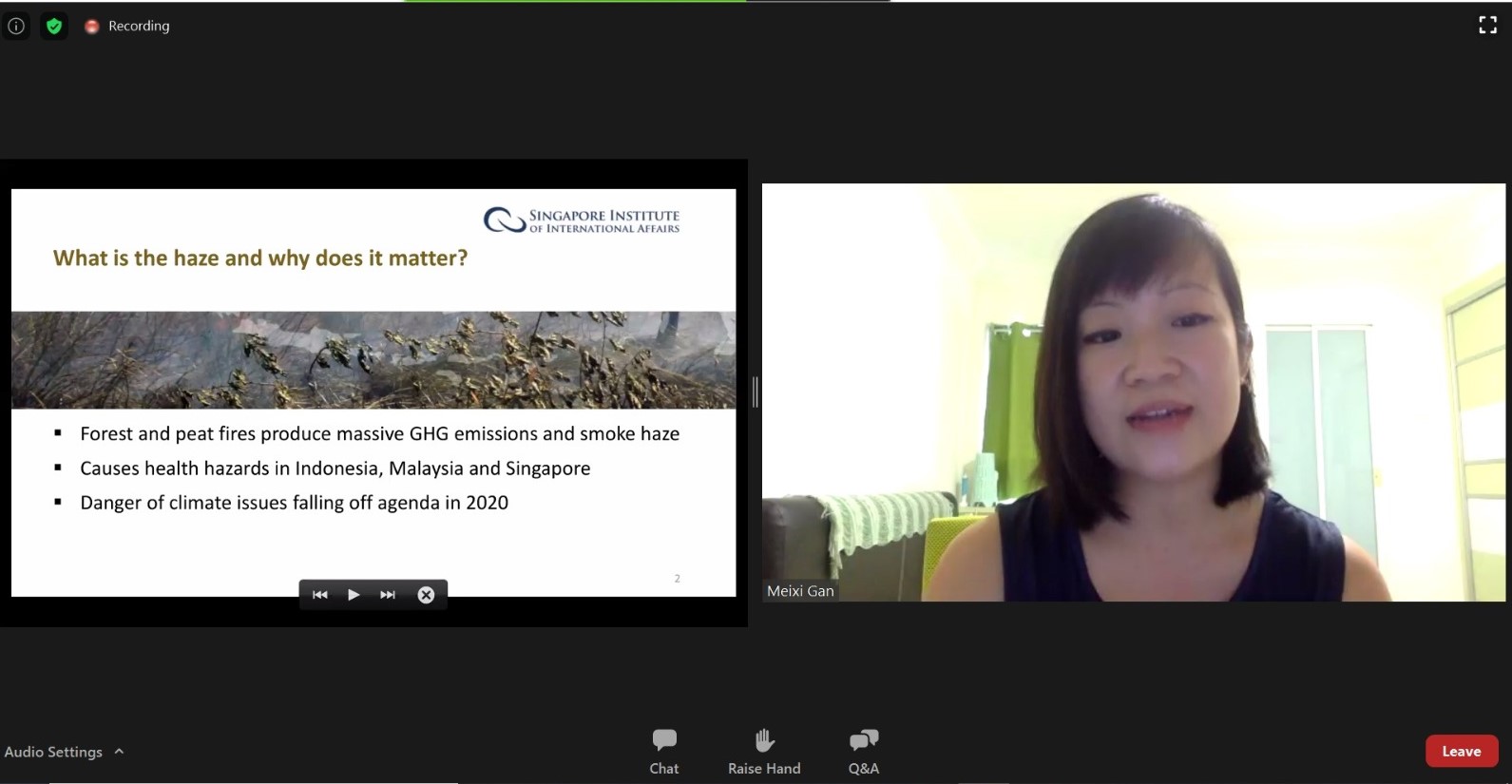The People’s Movement to Stop Haze (PM Haze) held a webinar, “Clear the Air 2020”, on 1 July 2020, to discuss the causes of the transboundary haze problem and potential solutions. Ms. Meixi Gan, Assistant Director of Sustainability at the Singapore Institute of International Affairs (SIIA), Ms. Perpetua George, Assistant General Manager for Group Sustainability at Wilmar International, and Mr. Benjamin Tay, Executive Director of PM Haze discussed the likelihood of a severe haze incident this year and the role different stakeholders play in preventing the haze. A recording of the webinar is available on PM Haze’s Facebook page and YouTube channel.
Amber risk of severe transboundary haze in 2020
The SIIA Haze Outlook 2020, which is a risk assessment tool, assessed the risk of severe transboundary haze to be Amber this year, rated on a scale of Green, Amber, and Red. The risk assessment is based on three factors: weather (temperature and rainfall conditions), peat (policies and actions related to peat and land management) and people (human action, including fire prevention and firefighting efforts). During the webinar, Ms. Gan took participants through the results of this year’s assessment and highlighted that the COVID-19 pandemic, which has already hindered fire prevention and firefighting efforts, could increase the risk of severe haze event.
Peatland degradation is of significant concern
The SIIA’s Haze Outlook 2020 reported that peatland management is one of three main driving factors that might contribute to a severe haze event. Deforestation and peat degradation has long been a key sustainability concern in the region. Indonesia is home to much of the world’s carbon-rich peatland, but when degraded and burnt, these peat areas release massive amounts of greenhouse gas emissions. Despite the fact that the 2019 fires in Indonesia affected a smaller land area than the Australian and Amazon fires in the same year, the Indonesian fires produced almost as much greenhouse gas emissions as the other two blazes combined.
Focus on mid-sized companies to advance sustainability
Palm oil has been in the international spotlight in recent years, with the commodity accused of contributing to deforestation and land use change. Many major companies have committed to improving their sustainability standards, for instance joining the Roundtable on Sustainable Palm Oil (RSPO) and regularly reporting their progress on sustainability.
However, Ms. Gan highlighted concerns about medium-sized or national-level growers – organisations that still produce on a commercial scale, but do not have international visibility and often lack public sustainability commitments. While larger firms have sufficient scale to ride out the current economic downturn and are unlikely to abandon sustainability commitments during this period, companies with narrower margins may need to keep clearing and planting even amidst a poor market, and may resort to the use of fire as a cost-saving measure.
Ms. George identified “leakage markets” as a major source of concern. Many mid-sized or national-level companies have the capacity to impact sustainable production in the agribusiness industry, but are still selling to markets that do not require No Deforestation, No Peat, and No Exploitation (NDPE) pledges. Stakeholders and companies must engage the entire supply chain in order to advance sustainability in the agribusiness sector.
In some countries, there have been concerted efforts to boycott the use of palm oil. But Mr. Tay noted that boycotts are not feasible. Palm oil is in most products that ordinary consumers use. According to a PM Haze survey conducted in 2016, about 90 per cent of eateries in Singapore use palm oil in their cooking. Moreover, the livelihood of millions of people in the region depend on the palm oil sector. Therefore, there needs to be more focus on ensuring that the production of palm oil and other commodities within the region is sustainable, and that growth within the resource sector does not come at the expense of forest and peat ecosystems.
National policies must be implemented and enforced
The Indonesian government is taking fire and haze risk seriously following the 2019 haze incident. This year, Indonesian authorities have already conducted cloud seeding in Sumatra, and Indonesian President Joko Widodo recently told a special cabinet session that efforts to rewet degraded peat and maintain groundwater levels must continue. Despite Indonesia’s efforts, fires still occur during the dry season in areas that are protected by the law or are within company concessions. The COVID-19 pandemic has also hindered fire prevention and firefighting efforts, further exacerbating the problem.
To tackle this, the government must ensure that there is an overarching nation-wide policy that aims to mitigate peatland exploitation. The speakers agreed that efforts by Indonesia’s Peatland Restoration Agency (BRG) are important, and ideally BRG’s mandate should also be extended and expanded to target both private and public peatland areas. However, there is still uncertainty about the future of BRG. The agency’s original operating period is set to expire by the end of 2020 and it is not clear if its mandate will be extended.
Collaboration with stakeholders and throughout supply chain
With government resources already stretched by the pandemic and the related economic disruption, battling a haze incident in 2020 could further delay economic recovery. Ms. Gan emphasised that ASEAN countries, governments, NGOs, affected communities, and stakeholders must share resources and implement early measures to minimise fires and expand peatland restoration efforts.




